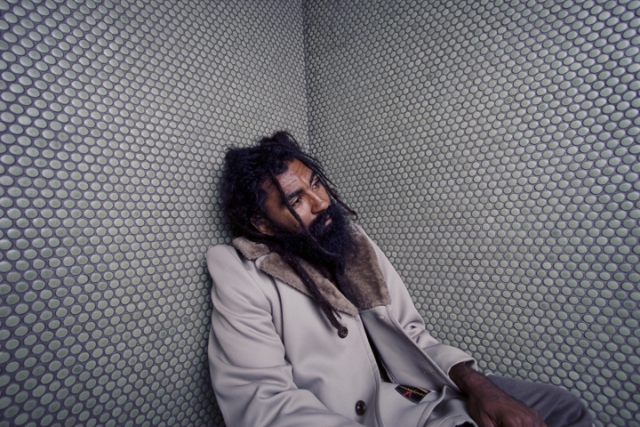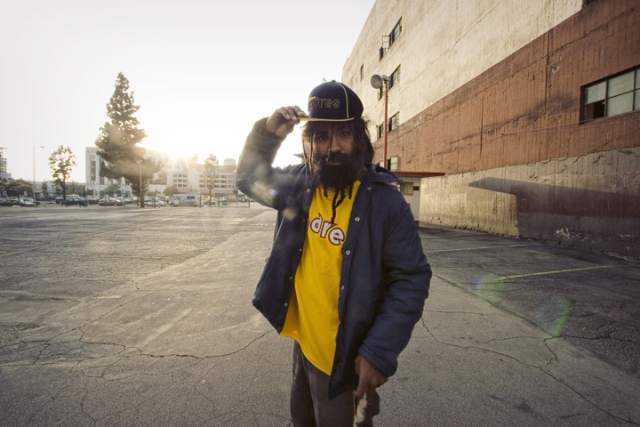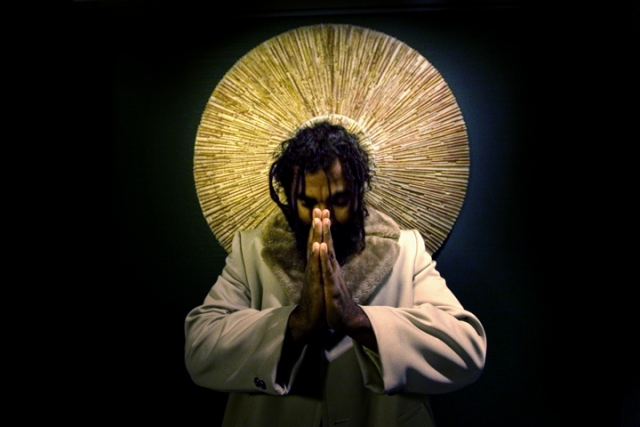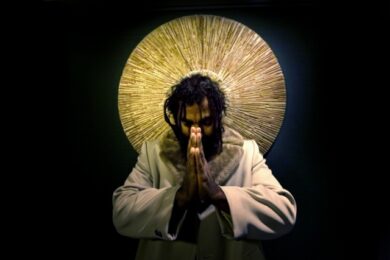Gonjasufi’s birth name is Sumach – after the flowering plant used to flavour Middle Eastern cooking and so beloved of his jazz fanatic father – and he’s “his present age”. He lives in Mojave Desert, on the outskirts of Las Vegas, but claims he has visited the Strip only a handful of times. He’s a recovering addict, though he says that his love for yoga, his children and his music has a stronger pull than any drug ever could, bringing him closer to himself and closer to God.
He’s also the man behind the Gaslamp Killer, Flying Lotus and Mainframe-produced A Sufi And A Killer, an inherently spiritual record that binds together mystical, whispered musings with the ragged fabrics of psychedelia, haunting desert laments and hypnotic Hindi chants.
It doesn’t take long to register the album’s strong religious undercurrent, but to see it as specifically Islamic in origin is to underestimate the scope of Sumach’s spiritual reach. Born into a family of Coptic Christians in San Diego, Sumach first studied Islam at college; he was turned off by the fundamentalists and attracted to the pursuit of divine unity pioneered by Sufi mystics. On top of that he has studied the Rastafari movement and the teachings of Krishna in the Bhagavad Gita.
Sumach says here that he’d be “a dangerous man” without music; that writing is for him “a vehicle to channel all this frustration and pain”. As such the album serves as a window into the two contrasting personalities fighting for possession of Sumach’s soul: the Killer on the one hand, the Sufi on the other.
There’s currently very little information about you as an artist. How would you describe the history of your musical career?
Gonjasufi: I grew up in a San Diego jazz family; my old man played a lot of jazz records. My mom was into things like the Gap Band and Marvin Gaye. The first song I really felt was some Benny King. Then at high school I got into the 90s hip hop movement, started collecting records and started out as a DJ. So I would say my first music movement was 90s rap, and from there I got into reggae and rock. The way I kind of described it – I don’t want to get boxed in and some shit – but I called it Hindi rock, the shit I was doin’. The first record I put together was a lot of Hindi samples with some rock shit.
The temptation for a journalist is to read things about your personality into the album. How much of you is in this record?
G: I would say that as far as the feeling and the conviction and the words go, I put all of me into it. It’s very personal exposing myself like that; going from singing very gently to screaming on the same song. I had to really spend a lot of time alone.
Did the production process lend itself well to you spending time alone?
G: Yeah, it did. Gaslamp Killer would just chop up shit. He’s in LA, so he’d send it to me out here in the desert and I could just be alone. Nobody knows where I’m at. I kind of stayed out of the scene, but he’s like my link to the scene.
You have a real live performance sound, like you’re fronting a band. Is that part of your history, or part of your future?
G: That’s what I’m looking for. This album is a way of calling out for a band. I need to record with a couple of cats that I can lock myself in a recording room with for a couple of months. It’s my call out, like I’m saying, ‘Who’s down to rock a stage with me?’
In your own words you like to avoid overly-computerised approaches to making music…
G: I’m not really into the sound wave; the filtering effect of computers. When I go to shows I need to see a show. I need to see cats sweating with their instruments. When I see cats with just a computer up there, I feel like going up and snatching the computer off the stage and being like, ‘Now what? If all the power went off in the world, can you still rock a stage?’ That’s where I’m at with music. The sound wave itself has become so thin that the new generation’s ears are tuned into this softer, more accessible sound. With this record I wanted to almost hurt the eardrums; shock people with the sound of something raw, something hard. And then, after a minute, it’s cut into the eardrum enough that it’s scratched off the resin of that microchip filth.

The album works very well as a platform for your voice, but it sounds like there are a lot of voices on there – on a track like ‘Sheep’, for example. Do you think this is a representation of internal conflict?
G: I would say so. It’s me reasoning and talking to myself. Different colours have got to come out. I want to take the whole rainbow of emotion.
Does the record bear any relation to Sufiism as a religious form? The dance, the trance?
G: Yes, definitely. In college, I was studying Islam a lot and rolling with Muslims. I got turned off by the fundamentalist side and turned on by the mystic side. I started studying the way of the Sufi, reading Hazrat Inayat Khan. I went from reggae and word sound power to sufiism. I saw the similarity in all. I was born a Coptic in a Christian family, and then I studied Islam. Then I studied Hindi. And for me it took the study of Krishna and Geeta and practising yoga to bring all of that into one space for me; to come full circle.
You mention misconceptions about Islam on the record. Is this something you feel needs addressing?
G: Oh yeah. I’m out here in America, where the truth can be very franchised – it gets watered down. People have no idea what Islam is – they think these cats that are blowing up buildings and car bombs are Muslims. To me, they’re as much Muslims as these Catholic priests that are molesting kids are Christians. A true Muslim and a true Christian is the same: they worship one god. The Western world depends on so much media, and people are afraid of Islam out here. They don’t really know what Islam is about. Christ being a Muslin…they don’t know about that. If I was to open that up, I’d be labelled a terrorist out here. The crazy thing about this record is that I have to get to the US audiences via London. America doesn’t want to hear. I’ve been here for 30 something years, and it took the London ears to pick me up. I have to come back to where I’m at from the other side of the planet for them to accept this.
True artists work for something other than fame or financial success…
G: If John Lennon and Jimi Hendrix and Bob Marley were alive, would they hold a concert at the Gaza Strip to see if they could stop a fight? Would they go to the Middle East and hold peace concerts? There’s nobody on the planet that I know of that’s willing to do that. If I had a band and had enough people listening at one time I would do that shit, you know? For me it’s like the collective mass. The power of thought and everybody focused on one thing is the most important thing in life on this planet. If everybody’s so tuned in to a television that’s dumbing down the frequency and telling them that Doomsday or Armageddon is coming, then that’s what’s going to happen. So when I made these songs, it was a prayer to the most high and a call out to the people. I wasn’t thinking about money, or a record deal, or fame or any of that shit. That was the furthest thing from my mind.
Sometimes it feels like the only way to make sense of your own life is to make music.
G: It is for me. If I didn’t have music I’d be dangerous man. It’s a vehicle for me to channel all this frustration and pain and shit.
A Sufi And A Killer a record of contrasts – of dark and light moments – but you talk overall about hope; you want people in certain situations to take hope. Is that true?
G: Yeah, I want people who are going through the same emotions to find a way to deal with it. Energy is energy. A lot of this record is about me taking all the negative emotions that I have as a result of the world’s ignorance and hatred and racism, and dealing with it by turning it into something good. If people are going to follow me, I want to lead them back to their true selves. People sometimes don’t believe in themselves; they have to find someone to believe in. It’s that person’s job to bring them back to believing in themselves. For me it’s like, ‘Look, I’m going through all this crazy shit just like you. This is how I feel – does anybody feel the same?’ If there are people who are getting ready to jump off the bridge, or they’re halfway out the window, then I like to imagine that my song might come on and they’ll say: wait a minute, turn that shit up for a minute. And they pull back. I want to get these cats that are blowing shit up to chill out, and I want to get these cats that are going overseas to kill my brothers to chill out. If this music can reach enough people to give me an opportunity to speak, then it’s got to be about serious stuff that’s going on.
What goes through your mind when you turn on the TV and see the state of music today?
G: Bullshit, man. It’s frustrating because I got kids. Luckily enough, they get to hear the real stuff, but it’s a disease man. You see a lot of these rappers and all they’re talking about is their money. And they have talent, no doubt. But when all I hear is, ‘I got more money than you,’ it makes you want to reach through the TV and snatch them out of it. These cats get to a point when they’ve made enough money to actually make a change in the world. You find out there’s no running water on 75 per cent of the planet, and then you switch over and there’s cats in America…I won’t name names because I don’t want cats coming after me, but these guys that are almost billionaires and what are they doing? This should be a rule: if you make a certain amount of money, then a percentage of that has to go to getting running water and shit to the rest of the world. I’m not going to support artists that are multi millionaires when there are millions of people that don’t have any running water.
The saddest part is that hip-hop is a movement that came from political expression. For it to now be a part of the mainstream must be frustrating.
G: Yeah, it’s pretty sickening man. We go from Public Enemy to where we’re at right now.
Your record is so far removed from the MTV brand of hip hop. Do you think that’s largely a result of the movement that’s going on at the moment in LA with Flying Lotus and so on?
G: Oh, definitely. What Flying Lotus has done is step out of the box and create a whole other box. He started a whole movement as far as I’m concerned. If you can’t learn to draw, you trace for a bit, but where he’s going with his sound now . . . I hear so many people trying to sound like him. He’s taken it to a different angle. And he’s opened up doors for me. He introduced me to Warp. What he’s doing I support 100 per cent.
You talk about the desert a lot. Does the landscape play a large part in developing your personality or sound as an artist?
G: I think so. I’m from San Diego, which is next to the ocean. Tracks like ‘Holidays’, ‘Candylanes’, ‘Duet’ . . . those were all recorded in San Diego. All those other songs were recorded out here in the desert, and you can tell – the feel is completely different. Even the altitude and the weather, all that is captured. That’s why I want to use analog mics and tapes. I feel that the way a sound is captured is just as important as the sound itself. On tape it resonates, and over time it sinks deeper into the tape, and more of the air and the environment is captured in that recording. You listen to Miles Davis, Charlie Parker, and you can hear the cigarette smoke. When I hear Billie Holiday I can feel like I’m in that room – the cigarette smoke, the slavery even. And I want that to come across in my own recordings: where I was on the planet, what I was feeling, how much I was sweating.

You also mention ancestors on the record. Is there a sense that you can pick up things on mics that you don’t expect? Do you think you’re communing on a spirit level in the desert?
G: Definitely, man. This is all sacred burial ground out here. It’s all Mexico really, and all the slaughter that went down of the so-called Indians is still present. Most people don’t give a fuck – they don’t give a shit about any of that – but this is all ancient burial ground. People are driving their cars over it and maddogging each other and it’s sad to see, because they’re ignorant of what’s underneath. And the crazy thing is that it’s all going to become burial ground again in a minute. These cats are gonna get buried in their cars. Their cars are gonna become caskets and shit.
Do you feel a commitment to revealing the apocalypse? A sense of despair at society?
G: I think this is a society that’s eating itself alive. What I’m understanding about time is that it’s speeding up – the days, the months. You can’t escape it: time is bringing us closer to the moment of now. And when you get closer to the moment of now, you’re dealing with yourself. You realise self. If you’re not ready to realise self, you’re gonna dissipate. In that alignment, when it takes place and we become 100 per cent fully realised, we reach godhead. If we’re all in the right state of mind. Then we can manifest the living god we’ve been looking for. That’s what I think it’s all about. That’s what I’m channelling when I’m making music. To realise self in the highest potential, and in doing so bringing others to their hightest potential. There’s no difference between me and my neighbour. Maybe we’re in different vibratory rates, but sometimes you need a more powerful battery to charge up the other. I need somebody to come around waken me up; resurrect me.



